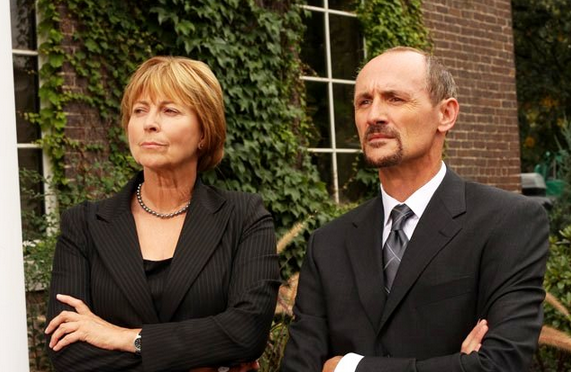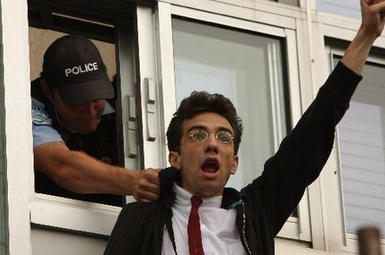Rise, comrades, from your slumber! A rousing film of the people awaits you this weekend! Ok, maybe not. But at least it’ll give you a good chuckle. This week’s movie recommendation is Jacob Tierney’s recent offbeat independent Canadian film The Trotsky (2009).
Leon Bronstein, played by the stoner-comedy staple Jay Baruchel, is a quirky high school student in Montreal. He’s a bright kid with a peculiar dress sense, theatrical flair, and fervid empathy with the plight of the worker. Understandable, really, when you consider that he’s the re-incarnation of Leon Trotsky. Ok, again, maybe not. But even if his belief is misplaced, he certainly takes it seriously: he takes his impassioned effort to cultivate class consciousness to the oppressed laborers at the local factory, where he hopes to organize a hunger strike.
There’s a small hitch. Leon’s dad (played by Saul Rubinek) is the oppressive factory owner from whom Leon petitions for the liberation of the workers. When the hunger strike barely crosses over from nuisance to inconvenience, dad sees a teachable moment. He pulls Leon from his plush private school and enrolls him in public school. This is all for the best, as it gives young Leon a ripe opportunity to sharpen his wits against the oppressive regime of Principal Berkhoff, played by Colm Feore, who sports an uncanny resemblance to Lenin. The rest of the film is about Leon’s efforts to rise to the occasion for which he feels destined, and this includes unionizing the school pupils, falling in love with an older woman named Alexandra, and hopefully being exiled from his home.
Part of the comic conceit is that young Leon’s efforts to emulate the life of the real Trotsky so obviously take priority above actually making good on the promises Trotsky might have made – when all’s said and done, if there’s a choice between gaining publicity for himself and liberating the oppressed, Leon seems to care more about the former than the latter.
Nonetheless, one of the heartwarming take-away messages is that the difference between boredom and apathy – the accurate diagnosis of which preoccupies much of Leon’s interactions with his fellow schoolmates – is that between people who are either yet to be roused to action, or those who cannot be so roused. If boredom is the affliction, then Leon fancies himself as the man capable of delivering the necessary message. And while Leon’s efforts throughout the film certainly seem self-indulgently theatrical, there’s a charm in his fanciful charade. For this, the role of Professor McGovern (played by Michael Murphy), a political theorist who’s wistfully nostalgic for his days of agitation at Berkeley in the ‘60s, is a useful foil: by the end of the film, the older characters are forced to wonder when they decided that the kind of futile idealism that Leon characterizes switched from something they encouraged to something they now view as pie-in-the-sky petty insurrection.
 Part of the fun in a film such as this is placing the references: some of them are straightforward (Trotsky’s search for an intellectual soul-mate by the name of Vladimir who will fill the role of his Lenin), while others are less so (the positioning of the characters is sometimes a little artificial, and held just long enough to evoke a propaganda poster). But the film does a good job of playing to different audiences with varying levels of familiarity with Trotsky lore. The lower threshold of audience familiarity with communist history is set invitingly low to ensure that only very few people will feel left out. If you’re one of those people whose knowledge of the real Trotsky’s life extends only as far as ‘something about a czar’ and ‘something else about a pick-axe,’ don’t worry: the bulk of the rest is covered within the film itself. There are, however, plenty of inside gags for those with more than merely a passing interest (a recurring nightmare of Leon’s, usually stimulated by some interaction in which another character has made him feel infantilized, is a nice witty reference to Battleship Potemkin). But there are plenty of base guffaws littered throughout to keep anyone entertained.
Part of the fun in a film such as this is placing the references: some of them are straightforward (Trotsky’s search for an intellectual soul-mate by the name of Vladimir who will fill the role of his Lenin), while others are less so (the positioning of the characters is sometimes a little artificial, and held just long enough to evoke a propaganda poster). But the film does a good job of playing to different audiences with varying levels of familiarity with Trotsky lore. The lower threshold of audience familiarity with communist history is set invitingly low to ensure that only very few people will feel left out. If you’re one of those people whose knowledge of the real Trotsky’s life extends only as far as ‘something about a czar’ and ‘something else about a pick-axe,’ don’t worry: the bulk of the rest is covered within the film itself. There are, however, plenty of inside gags for those with more than merely a passing interest (a recurring nightmare of Leon’s, usually stimulated by some interaction in which another character has made him feel infantilized, is a nice witty reference to Battleship Potemkin). But there are plenty of base guffaws littered throughout to keep anyone entertained.
The supporting cast is wonderful, with particular highlights from Leon’s father and Principal Berkhoff. Sure, it’s a high school comedy, but the audience extends far beyond the usual stoner crowd that forms the main draw for most films of that ilk and for which Baruchel often appears as a principal character.
